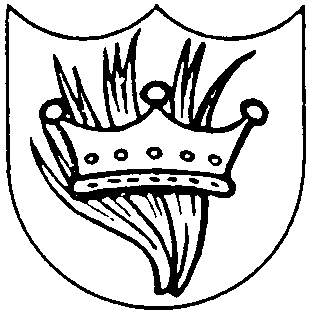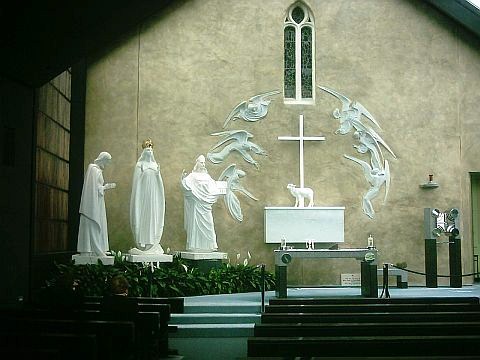
Mother Marie-Therese was now facing a difficult decision: would she pack up the sisters in the ten minutes available to them and flee Korea for Japan? She was never one to run from a fight. She, Mother Marie-Mechtilde and others had endured harsh sufferings through two wars, could they face another one? "Would the plane take all the sisters?" she asked. "No", the bishop responded, "only the European ones." The Korean nuns could not leave.
Marie-Therese quickly called a meeting of the European nuns to tell them of the offer. They all had absolute freedom of choice to stay or go. They asked her what she had decided, but she refused to tell them in case it influenced their decision. They knelt in prayer. Each made their own decision and they all came to same conclusion: they would not go without their Korean sisters - they were staying. Mother Marie-Therese went to inform the Bishop. When he heard it, and that not even the blind Sr Madeleine would leave, he was touched by their courage and loyalty. When the Korean nuns heard of what happened they wept: their sisters would not abandon them.
As the fighting began the nuns continued their observance, praying in their chapel as the guns were fired outside. The monastery was in the direct path of the invading army, and so it was decided that the community should leave and find a safer building. However some feared the monastery would be pillaged, so it was decided that a small number, eight, would remain behind to do what they could to protect it. The chaplain, Fr Gombert would keep an eye on the remaining nuns and should things get too dangerous he would take them out to safety. All agreed, and the community went to the Sisters of St Paul of Chartres and safety as eight remained. But things did not turn out as expected. The convent of the Sisters of St Paul came under direct attack and soon Fr Gombert felt it was too dangerous, and brought the sisters to the safety of his cellar. There in the cellar with others seeking refuge, Fr Gombert exposed the Blessed Sacrament and led adoration and Benediction. The vigil of prayer ended with Mass at dawn on the 28th July 1950. They then went to the Carmelite monastery for safety.
The North Korean army was devastating the city. The bishop's house had been destroyed and the Sisters of St Paul had been given three days to leave their convent. For some strange reason the soldiers seemed oblivious to the monastery at first, but it did not last. Soon "inspections" were ordered, and the soldiers questioned the sisters. The Koreans were rebuked for their decision to join the Order and deprive Korea of children. Tensions grew and the visiting soldiers became more aggressive. On the 14th July the sisters were told that all the Europeans had to gather at the bishop's house. Mother Marie-Therese sent the Korean postulants back to their families, and the next day, the 15th Mother Marie-Therese, Mother Mechtilde, Sr Henrietta, Sr Madeleine and Sr Bernadette were piled into cars with Fr Gombert and two other priests and brought to a hotel which was now designated a camp. There the Bishop and a number of others were also interned. Over the next few days other Bishops, priests and nuns arrived. On the 19th July the order came for some to leave: they were to go to Pyongyang.
Put on a train the sisters arrived at the North Korean capital on the 21st July. Bundled into a truck they were brought to open fields and then, ordered out, they had to walk to their destination several miles away: a camp. They were moved again, in great hardship to Manpo in September, where they stayed for six weeks. The group of captives was growing, and now included a large number of captured American soldiers. On the 7th October, as winter was drawing in, they were told they had to depart: the Death March was about to begin. After what seemed liked aimless wandering for a few weeks, on the 31st October they were handed over to the custody of the Police Department.
The March began on the 1st November. Amid dreadful hardship, hunger and cold the prisoners walked towards an unknown destination. The guards cried out "Hurry, hurry!" and people began to fall and die, their bodies hastily buried under piles of stones along the side of the road. One of their companion Sr Beatrix, a sister of St Paul of Chartres, was the first to go: unable to continue she was left behind with one of the soldiers. Disease and exhaustion began to claim others, including Fr Gombert.
On the 16th November 1950, Mother Marie-Mechtilde and another sister, now invalids, were left behind. After a difficult journey, she was brought to a camp, Hachang Ri, where, surrounded by other prisoners, a priest among she died of her sufferings on the 18th November. Her body was buried near the camp.
Meanwhile on the 19th November, Mother Marie-Therese complained of a pain in her side. She had a fever and was suffering from dysentery. Her appetite was gone, but she tried to eat a little. Over the coming days the pain increased, and on the 28th she began to have crippling headaches. Lying on her meagre camp bed, the other sisters gave her their blankets to keep her warm, but she soon fell unconscious. At 2am on the morning of the 30th November, she died. Her body was buried in a shallow grave.



















